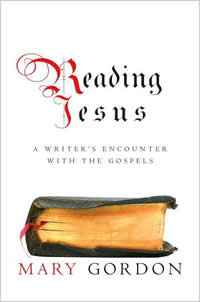Book Notes
 Mary Gordon, Reading Jesus; A Writer's Encounter with the Gospels (New York: Pantheon Books, 2009), 205pp.
Mary Gordon, Reading Jesus; A Writer's Encounter with the Gospels (New York: Pantheon Books, 2009), 205pp.
A few years ago Mary Gordon (b. 1949) was stuck in a taxi in New York City's rush hour traffic. When the driver turned on the radio she was forced by her captivity to listen to some drivel on Christian radio. Gordon, an award-winning author and the Millicent C. McIntosh Professor in English and Writing at Barnard College since 1988, has written fifteen novels, memoirs, and works of literary criticism. She was raised as a Catholic and so was familiar with the Scriptures at some level, but listening to the radio that day provoked a realization that filled her with "a clutch of anxiety and shame." She was almost sixty but had never read the Gospels straight through from the beginning of Matthew to the end of John. This book is the result of that "disturbing and exhilarating enterprise."
Gordon does not let herself off the hook with a superficial reading: "It seemed to me that if I were going to take this project seriously, I would have to question my own reading, and examine its lacunae: I would have to ask myself, do I really know what the Gospels are about, or have I invented a Jesus to fulfill my own wishes?" In her book she thus aims "for a tone that is personal and self-questioning." In the first half she explores what draws her to Jesus as the "irresistible incomprehensible." Beginning with the prodigal son, she wonders about God's "economy of mercy" that invites celebration, joy, and generosity, but which also asks us, "are you envious because I am generous?" And so "the radical challenge of Jesus: perhaps everything we think in order to know ourselves as comfortable citizens of a predictable world is wrong."
In the second half of her book Gordon turns to problem texts, "for there are as many reasons for being appalled by Jesus as there are for being drawn to him." Even though she admits that it's tempting to follow Jefferson and excise from the Bible what you don't like, she's far too honest to take the easy way out. Miracles are a problem for post-Enlightenment moderns dedicated to the scientific method, but in the end she would not delete them. Calls to asceticism and self-denial make her wonder about happiness and pleasure. The call to "be perfect" sounds ideal but it's impossible. Apocalyptic language is violent and encourages readers to see themselves as elect and their enemies as eternally damned. The anti-semitism of John and the divinity of Jesus complete her survey of problem texts.
In a final and separate chapter Gordon contemplates the seven last words of Christ. "What words could be plainer than these? The plainness of the language gives me the courage for a plain assertion, an assertion that I find embarrassing to make. But embarrassment is not one of the great emotions, and these words demand the attempt at a response that does not mire itself in self-regard. So now I say: these words are the foundation and basis of my religious life. They serve for me as a filter, or a funnel, in which everything that has gone before in the Gospels pours itself, and arrives at the end as a pure tincture: clear, usable, entirely free of sediment and residue. The living water. The water of life." These are not the last words of Oedipus, Lear, or Alexander the Great, she observes. "They are the seven last words of Jesus. Whose death either has no meaning or creates a meaning unique in the history of the world."


